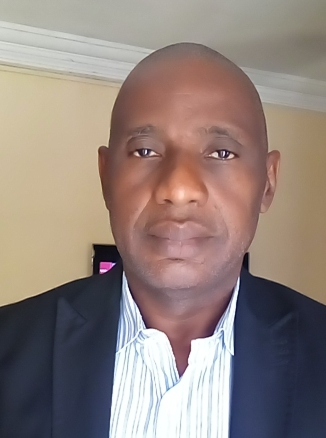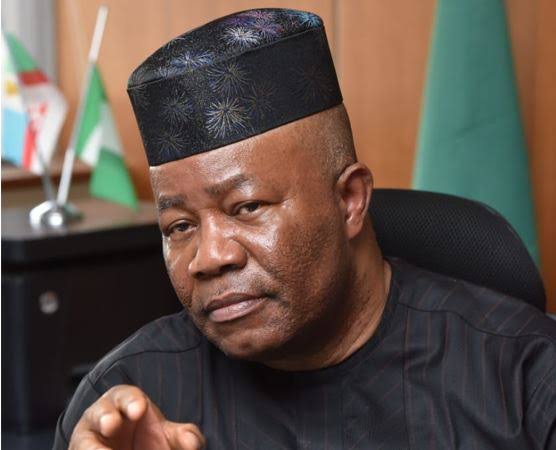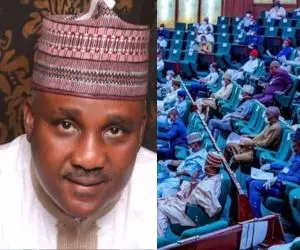Opinion
10th National Assembly: Nigeria’s last chance

By Mon-Charles Egbo
In a few days, the presiding officers of the Senate and the House of Representatives would be elected upon the inauguration of the 10th national assembly. This event, typical of every contest, would throw up two categories of people: those who are pleased with the outcome and the ones who feel otherwise.

Understandably, the wishes of both sides are interests-driven though it cannot be immediately established whether the interests are about the country or individuals.
But on the belief that it is about nationalism, then head or tail, it is a win-win for Nigeria. This is because logically, both divides mean well for the nation only that their perceptions differ. And again, while spirited attempts, largely motivated by multi-dimensional sentiments, are made to externally influence the choices of the legislators-elect, the decision as to who would become their presiding officers begins and ends with them. Whether by consensus or merit, they are the ones that make the choices in the final analysis. It is within their exclusive rights and priviledges and also, the election is a process that has strict conventions. So the outcome, like the two sides of a coin, coincides or is at variance with the wishes of the outsiders, once again, depending on whether their interests are broad or narrow.
Therefore as the 10th national assembly comes on stream, the basic public expectation is a sustainable dispensation of good governance delivered by a legislature that is people-oriented and under a leadership that is defined by dexterity, creativity and absolute loyalty to the people. For emphasis, Nigerians today deserve a responsive parliament driven by a deliberate commitment to regular citizens’ engagement.
Granted, these aspirations are as non-negotiable as they are core dividends of democracy. Yet, they are not automatic. They can only happen with the active involvement of a vigilant citizenry as researches show that strong democracies the world over are characterized by robust citizen participation. In other words, there can never be effective leadership without effective followership. This is the reason every well-meaning Nigerian should urgently pause and ponder on the prevailing sorry state of the country.
This is imperative because except for ignorance or mischief, it is glaring that we cannot hand over to our children, the same country that we inherited from our fathers. The signs are there yet we seem indifferent. Or, are we not alarmed by the grim prospects of losing things and persons very dear to us, including innocent children, if Nigeria fails? What about the mental agony of losing personal liberties and becoming captives in our own land, irrespective of status? Are the masses not yet seeing the damning consequences of their age-long prejudice and hostility towards the national assembly? Are we not yet persuaded that certain things should either not have happened in the first place or should have happened differently if only we were actively involved in the goings-on in the national assembly since 1999? Could we have been this mercilessly impoverished and short-changed sequel to leadership deficit? Truly, every heart should bleed over Nigeria’s precarious situation because when it rains, no roof is spared.
However, there is good news. There is a ray of hope. A new beginning is possible. Nigeria can still work. But once again, it is a function of our actions now. Yes, our future is in our hands. Before us right now is an opportunity, possibly the last, to act, lest Nigeria slides into absolute failure.
So, if what informs our concerns and interests regarding the choice of the presiding officers are really borne out of patriotic and nationalistic ideals, despite the eventual outcomes, then we are morally liable for the success or failure of the 10th national assembly. Yes, what it becomes depends on what we do or fail to do now.
Hence if we wish not to bungle this last chance, then we should right away stand up and be counted. We must embrace this 10th national assembly as truly our own. We should seek to be fully abreast of its scheme of things. We have to accord it all the necessary support and cooperation for it to excel. It is no longer about short-term benefits but about what unites us and aids our journey to nationhood. Everyone should immediately remove their togas of ethnicity, religion and partisanship and think Nigeria first! The media, civil society organizations, professional bodies, labour unions, youth, women and community-based groups, the political class, as well as the clergy, should put on garments of activism in championing a legislature that derives its legitimacy and relevance from the people. Every mouth should loudly speak against bad governance whenever and wherever it occurs.
With an open mind, we should pay attention to how the legislature supervises the other arms, especially the executive. Specifically, we should demand explanations from the 10th national assembly as to why the country’s refineries are not operational and what they hope to achieve in the face of Nigeria’s dire situations, particularly the raging petroleum subsidy questions, poverty index, youth unemployment, insecurity, rising debt profile, health, education and power sectors, budget performance, federal character principle and then, why the federal executive council is awarding contracts without the public procurement council in place. We should clamour for legislative agenda with timelines and whose deliverables can translate to tangibles in the immediate, instead of high-sounding achievements that would exist only on paper and make no meaningful impacts in the lives of the people in the long run.
Then dispassionately, in pursuing these programmes of action, we should be seen to be fair, right and just always. We should be considerably articulate, skilful, objective and law-abiding. We should be alert, probing and listening and then be guided by reciprocal respect for these leaders. We should reject every form of confrontation, rumour-mongering, mutual suspicion and hate.
Equally, we should vehemently resist the divisive instrumentalities of religion, tribe and politics. We should seek to build social bridges always by being at the right places, saying the right things and then doing the right things at all times. We should commend and condemn when necessary. Where we stood before the election and subsequent inauguration of the assembly should not matter to us again. Rather, we should be anxious to see the 10th national assembly succeed by working through our representatives for issue-based engagements with the institution towards the attainment of a Nigeria where democracy and good governance reign supreme.
Using our periodic interactive sessions or town hall meetings with them, and their feedback channels, we should consistently demand accountability from the individual representatives while also availing them of useful information. Any lawmaker that is not accessible, principally through their functional constituency offices, should be called out respectfully. And while we keep records of our engagements with them for future reference, we must not distract or blackmail them with self-serving burdens of demand.
For the umpteenth time, if we live above board in our conduct this national assembly would always reflect the truism that “to whom much is given, much is expected” and also that as leaders, they are merely fellow citizens elected by loyal citizens and entrusted with the popular mandate. Also, the legislators would demonstrate indeed that they are agents and trustees of the people, and as such should always embody our wishes and desires. Furthermore, through our sustained advocacy, they would always draw a line between politics and governance in their actions.
Then above all and because equity demands clean hands, the first step in achieving all these is to have a fair knowledge of the workings and core mandates of the legislature. It is important also that we understand some operational challenges being faced by the national assembly. For instance, the 1999 constitution is not reasonably protective of the legislature, especially in its supervisory roles on the executive. Serially, there are no definite consequences for acts of disregard for the powers of the legislature by the executive. The former apparently exists at the mercy of the latter. Even more pathetic is the case of the state governors. But in the interim, it is only when we operate from an informed perspective that we can be factual and objective in our expectations and engagements with lawmakers.
And so in conclusion, this is just an early warning! The occasion calls for rapid and decisive actions. This is the last chance to redirect the ship of the country from the brink of collapse following the failure of governance, insecurity, corruption, unemployment and poverty.
As such, we the people, as the ultimate owners should immediately rise and take back the legislature. And in this, we have to let enthusiasm, patriotism, resilience and diligence guide us, so that “the labours of our heroes past shall never be in vain”.
Egbo is a public relations practitioner and can be reached at moncharles@yahoo.com

























